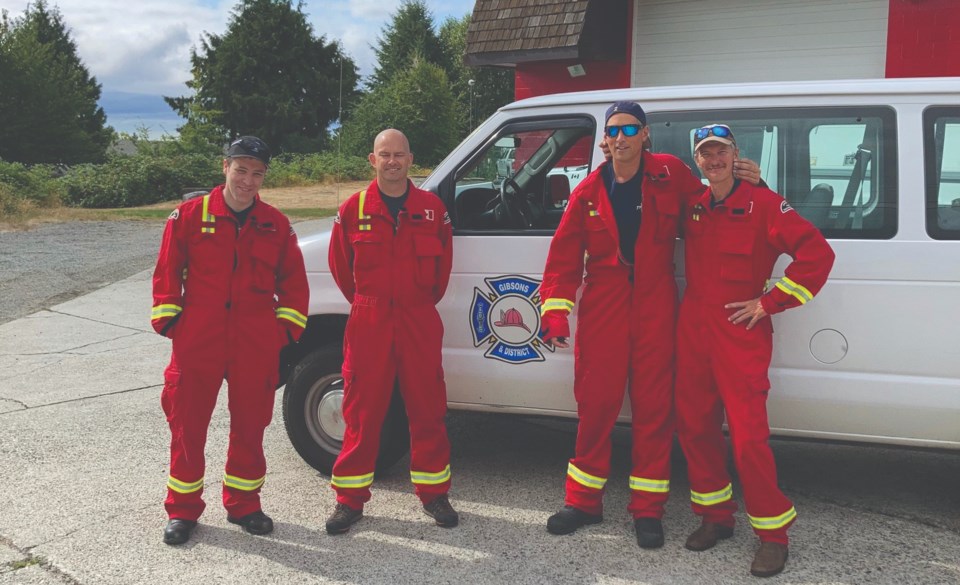A second deployment of firefighters from the Sunshine Coast has gone to the frontlines of wildfire response efforts in the interior of the province.
On Aug. 8, four volunteers from the Gibsons and District Volunteer Fire Department left for the White Rock Lake fire northwest of Vernon, where an estimated 56,500-hectare wildfire was still classified as out of control as of Aug. 11. The fire was first discovered nearly a month before on July 13.
Their mission follows the first deployment, from July 24 to Aug. 3, of four volunteers from the Roberts Creek and the Halfmoon Bay fire departments. They were based in Cache Creek while responding to multiple fires in the area, including one side of the Lytton fire.
Among them was Deputy Fire Chief Sean Hatanaka of the Roberts Creek Volunteer Fire Department, who told Coast Reporter they were part of the effort to prevent the Lytton fire from moving toward Merritt and other communities in the valleys.
“When we first arrived in that area, the fire had just run through and had done some significant damage to the surrounding area,” Hatanaka said. “We were driving through a lot of burned areas or areas that were still burning a lot of smoke.
“This smoke can block out the sun and it just kind of chokes everything down. It’s really stifling... The smoke itself is scary, but the flames even more so.”
Part of their response included working with other firefighters to set up sprinkler systems and shuttling water to maintain the supply. They also checked on homes to make sure there were no spot fires and provided help making properties FireSmart by clearing brush or moving potential fuel away from structures.
Although there was an evacuation order in effect, some residents chose to stay, so the volunteer firefighters would check in on them to make sure they were safe. In case the situation escalated, there was a plan to help the remaining residents so no one was left behind.
“Every day is a little bit different, and it’s going to be different for every deployment because every fire is different,” Hatanaka said. “It’s really dependent on the community, the community’s needs and then what the fire dictates.”
Some respite came with rain and less wind toward the end of their deployment, which helped calm down the fire somewhat.
Now that the first deployment is back home, Hatanaka said he feels a sense of fulfillment, but also some guilt for those still living the experience and who will need to rebuild. Coming back to the Coast was emotional, he said.
“It’s one of those things where Mother Nature can just be so beautiful, but also so brutal, and to see how scary that is firsthand,” he said. “You can lose everything in a blink of an eye. It gives you a lot more appreciation for where we live and for what we have.”
Although it wasn’t the first deployment Hatanaka has been a part of (he also went in 2018), he said this past deployment touched him in a different way, and he came away inspired. He’s hoping to use what he learned from other fire departments to help the Roberts Creek department, particularly when it comes to recruitment and retention.
“One of the reasons that I’m in a volunteer fire department is because I really care about my community and want to be able to give back in a way and feel like I’m contributing to something more than just my household,” he said. “And for us to be able to do that on a bigger scale, for our community to be able to loan out our manpower or our equipment in order to help save something – I would want somebody to step up and help my family if my family was in need.”
Hatanaka also said the Roberts Creek Volunteer Fire Department is looking for more volunteers, and those interested should get in touch. All the training is provided for free.
Anyone looking for information about fire safety can find more information at firesmartbc.ca. Hatanaka also said people are welcome to speak with their local fire department.
“I think we get a false sense of security, because we live on the Coast and we’re by the water,” he added. He’s imploring smokers to stop throwing butts out the window “because those small fires that do happen from a thrown cigarette, they can take out a community.”




